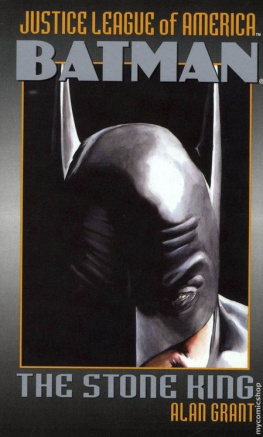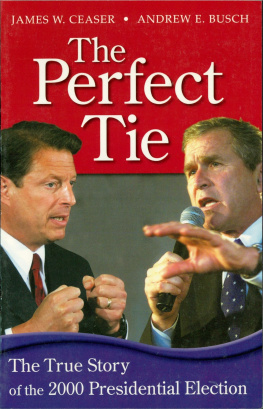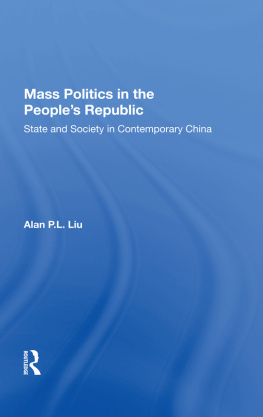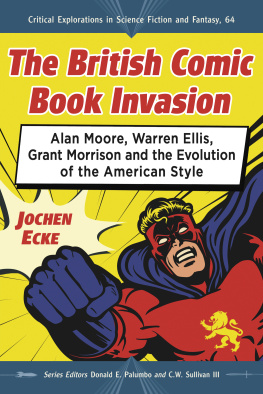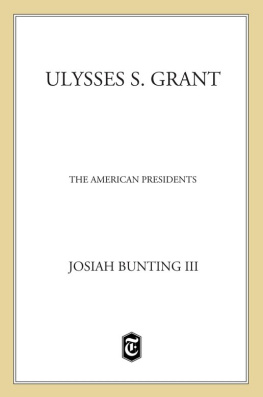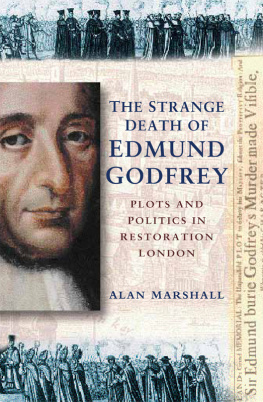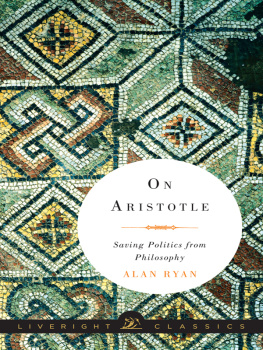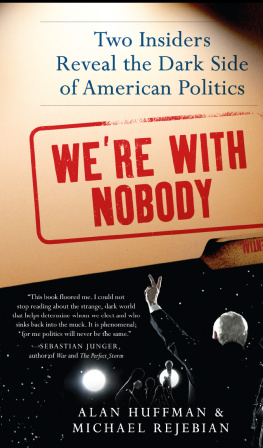AMERICAN POLITICS: 2000 AND BEYOND
American Politics: 2000 and Beyond
Edited by
Alan Grant
Oxford Brookes University
First published 2000 by Ashgate Publishing
Reissued 2019 by Routledge
2 Park Square, Milton Park, Abingdon, Oxon, OX14 4RN
52 Vanderbilt Avenue, New York, NY 10017
Routledge is an imprint of the Taylor & Francis Group, an informa business
Alan Grant 2000 Editorial matter and Introduction. Individual chapters (in order) Edward Ashbee, John E. Owens, Tim Hames, John Dumbrell, Peter Falconer, Robert McKeever, Martin Durham, Nigel Ashford, Alan Grant, Philip John Davies, Alan Grant 2000.
All rights reserved. No part of this book may be reprinted or reproduced or utilised in any form or by any electronic, mechanical, or other means, now known or hereafter invented, including photocopying and recording, or in any information storage or retrieval system, without permission in writing from the publishers.
Notice:
Product or corporate names may be trademarks or registered trademarks, and are used only for identification and explanation without intent to infringe.
Publisher's Note
The publisher has gone to great lengths to ensure the quality of this reprint but points out that some imperfections in the original copies may be apparent.
Disclaimer
The publisher has made every effort to trace copyright holders and welcomes correspondence from those they have been unable to contact.
A Library of Congress record exists under LC control number:
Typeset by Manton Typesetters, Louth, Lincolnshire, UK.
ISBN 13: 978-1-138-70464-0 (hbk)
ISBN 13: 978-1-315-20261-7 (ebk)
Contents
Alan Grant
Edward Ashbee
John E. Owens
Tim Hames
John Dumbrell
Peter Falconer
Robert McKeever
Martin Durham
Nigel Ashford
Alan Grant
Philip John Davies
Alan Grant
Guide
Edward Ashbee is Head of Social Studies at Denstone College. He is the co-author of US Politics Today (1999) and has written articles on immigration, race and American national identity.
Nigel Ashford is Senior Lecturer in Politics at the University of Staffordshire. He is the co-editor of A Dictionary of Conservative and Libertarian Thought (1991) and Public Policy and the Impact of the New Right (1993), is co-author of US Politics Today (1999) and author of articles and chapters on the Republican Party.
Philip John Davies is Professor of American Studies at De Montfort University, Leicester. Most recently he has been the co-author of A History Atlas of North America (1998), co-editor of Political Parties and the Collapse of the Old Orders (1998) and author of US Elections Today (1999).
John Dumbrell is Reader in American Politics at Keele University. He is the author of The Making of US Foreign Policy (1990, 1997), The Carter Presidency (1993, 1995) and American Foreign Policy: Carter to Clinton (1997).
Martin Durham is Senior Lecturer in Politics at the University of Wolver-hampton. He has published extensively on right-wing politics in Europe and the United States and is currently working on a book on the Christian Right, the Patriot movement and the modern American Right.
Peter Falconer is Senior Lecturer in Comparative Public Administration at Glasgow Caledonian University. He has published articles on a number of aspects of US government and politics and is currently completing a book entitled Congressional Oversight in the US: the Politics of Legislative Investigation.
Alan Grant is Senior Lecturer in Politics at Oxford Brookes University. He is the author of The American Political Process (1979, 1982, 1986, 1991, 1994, 1997), co-author and editor of Contemporary American Politics (1995) and author of recent articles on American elections, campaign finance, legislative term limits and federalism.
Tim Hames is a political writer with The Times, having previously been Lecturer in Politics at Oxford University. He is the co-author of Governing America (1996) and author of numerous articles, chapters and pamphlets on American politics.
Robert McKeever is Senior Lecturer in Politics at the University of Reading. He is the author of Raw Judicial Power? The Supreme Court and American Society (1995), The United States Supreme Court: A Political and Legal Analysis (1997) and is the lead author of Politics USA (1999). He has also written various articles and chapters on US politics.
John E. Owens is Reader in United States Politics in the Centre for the Study of Democracy at the University of Westminster. He is the co-author of After Full Employment (1986) and Congress and the Presidency: Institutional Politics in a Separated System (1998) and co-editor of The Republican Takeover of Congress (1998). He has also published numerous articles on aspects of the US Congress.
Alan Grant
On Friday 12 February 1999 the hundred members of the United States Senate solemnly voted as to whether President William Jefferson Clinton should be removed from office in the first presidential impeachment trial for more than a century. By failing to muster the two-thirds majority required by the Constitution, and thereby acquitting the President of the charges of perjury and obstruction of justice, the Senate ended a year-long drama that had dominated Washington politics and become a media obsession. For some the process had been a pointless and partisan witchhunt by conservative Republicans and a gross intrusion into the President's private life; for others it had demonstrated that constitutional and legal mechanisms that were established by the Founding Fathers to check the abuse of power in the American system of government still worked effectively to expose wrongdoing in the White House.
Certainly, no one emerged from the saga with their reputations enhanced. President Clinton was roundly condemned, even by his Democratic allies, for his irresponsible behaviour with Monica Lewinsky, for lying to the American people about the affair, and for bringing the presidential office into disrepute. The Republicans in Congress were punished in the 1998 mid-term elections for their apparent obsession with the scandal and for ignoring public opinion on the question of continuing with the impeachment process. The independent counsel, Kenneth Starr, was accused of wasting large sums of public money on his investigation and of excessive zeal in pursuing the prosecution of the President.
A few months later, in June 1999, President Clinton predicted that the continuing strength of the American economy could mean that the cumulative federal budget surpluses over the next 15 years may well wipe out the national debt by 2015. The revenue surpluses would allow the social security and Medicare systems to remain solvent well into the twenty-first century and also provide scope for tax cuts. As the millennium approached, these two events seemed to epitomize a fundamental dichotomy in American public life. On the one hand, there was good news and optimism about the economy and society more generally, with almost every indicator pointing in the right direction. On the other hand, an increasing number of Americans seemed to have lost confidence in their governmental and political institutions.




